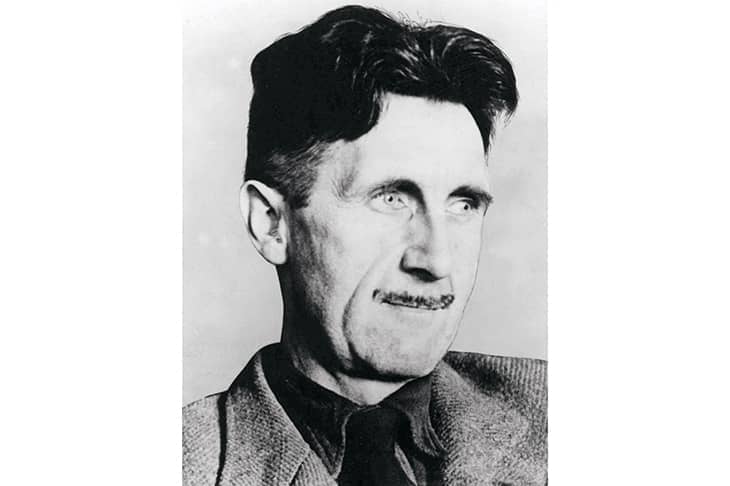When George Orwell’s publisher, Fredric Warburg, read the manuscript of Nineteen Eighty-Four in December 1948 he wrote a rapturous report to his colleagues, saying that the book was ‘worth a cool million votes to the Conservative party’. He described it as ‘a deliberate and sadistic attack on Socialism and socialist parties generally. It seems to indicate a final breach between Orwell and Socialism’.
Warburg had known Orwell for more than a decade. If he believed that Orwell had swung to the right, it is hardly surprising that other readers of Nineteen Eighty-Four got the same impression. Orwell was too sick with tuberculosis in 1949 to write more than a few book reviews. He told Warburg that he had ‘a stunning idea for a very short novel which has been in my head for years’, but he was never able to write more than a few pages of this book – titled A Smoking-room Story – before he died in January 1950. The notes he left behind show that the novel was to be set in Burma in the 1920s and was in the style of his non-political pre-war novels, but since it was never completed his two anti-communist masterpieces Animal Farm and Nineteen Eighty-Four became his swan song. Within a few years the CIA had secretly funded cinematic versions of them both.
As Orwell’s reputation grew after his death, conservatives, socialists and libertarians were all keen to claim him as one of their own. His fans on the right got a boost in 1996 when it was revealed that he had given a list of ‘cryto-Communists and fellow travellers’ to the Foreign Office while in a sanatorium in April 1949. This was the final straw for some on the far-left, but Orwell had made never made any secret of his contempt for Stalinists and his friend Richard Rees said that the list was complied as ‘a sort of game we played’ rather than a serious effort to uncover reds under the bed. Nevertheless, Orwell’s notorious list included at least two people who turned out to be Russian agents.
Throughout his career, Orwell spent more time squabbling with his comrades on the left than attacking capitalists. His first political book, The Road to Wigan Pier, is most memorable for the extended rant about the state of the socialist movement which, he wrote with dismay, attracted ‘every fruit-juice drinker, nudist, sandal-wearer, sex-maniac, Quaker, “Nature Cure” quack, pacifist, and feminist in England’. But this was friendly fire. There is no evidence that Orwell was warming to capitalism towards the end of his life, nor did he ever abandon what he called Democratic Socialism (always capitalised).
He could not have been clearer about this. In June 1949, he put out a statement – the last thing he ever wrote for publication – to set the record straight, saying: ‘My novel is not intended as an attack on socialism or on the British Labour party (of which I am a supporter)’. As Christopher Hitchens put it, ‘Orwell was a conservative about many things, but not politics.’ He was, wrote Hitchens, ‘a libertarian before the idea had gained currency’. True enough, but he was unquestionably a left-libertarian.
It is, of course, tempting to speculate about whether Orwell’s politics would have changed had he lived a few more decades, and such speculation has the added benefit of being impossible to gainsay. Orwell was certainly capable of changing his mind. In ‘The Lion and the Unicorn’, written in 1940, he predicted that once the economy was nationalised ‘the common people will feel, as they cannot feel now, that the State is themselves.’ He could dismiss the tyranny of the Soviet Union as a revolution betrayed – as being not ‘real’ socialism – but by the time he wrote Nineteen Eighty-Four he was having grave doubts about whether tyranny could ever be avoided when so much power was put in the hands of so few people.
You can see him grappling with this in ‘The Theory and Practice of Oligarchical Collectivism’, Nineteen Eighty-Four’s book-within-a-book that seeks to explain how the Party came to power. Through the voice of book’s supposed author, Emmanuel Goldstein, Orwell explains that:
It had long been realised that the only secure basis for oligarchy is collectivism. Wealth and privilege are most easily defended when they are possessed jointly. The so-called “abolition of private property” which took place in the middle years of the century meant, in effect, the concentration of property in far fewer hands than before: but with the difference, that the new owners were a group instead of a mass of individuals.
Orwell could clearly see the dangers of socialism, but since he believed that capitalism was doomed and socialism was the only game in town, he had to believe that these dangers could be avoided and that his own brand of libertarian collectivism could prevail. And so he reached for the same comforting explanation for Big Brother’s tyranny as he had for the Bolsheviks’ – that they were bad actors from the outset and had never really believed in socialism.
Up to a point, this was fair enough. In 1948, communism was still an n=1 experiment. It was still possible to believe that economic liberty could be divorced from civil liberty. The question is whether Orwell would have changed his mind if he had lived to see what took place beneath the hammer and sickle in China, North Korea, East Germany, Albania, Romania, Venezuela, Cuba and many other countries in the twentieth century. The answer, of course, is that we don’t know. My belief is that he would.
Christopher Snowdon is the author of You Do Not Exist: An Introduction to Nineteen Eighty-Four, published today by the Institute of Economic Affairs to mark the novel’s 75th anniversary.







Comments